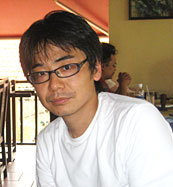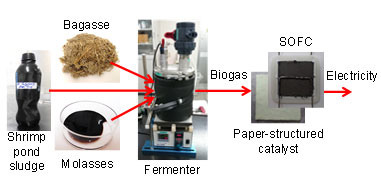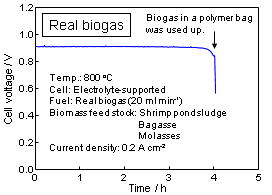Science and Technology Research Partnership for Sustainable Development (SATREPS)
Project URL:https://www.jst.go.jp/global/english/kadai/h2602_vietnam.html

Associate Prof. SHIRATORI Yusuke
(International Research Center for Hydrogen Energy, Kyushu University/Faculty of Engineering, Kyushu University)
Vietnam’ rapid economic growth has resulted in two big issues - the environmental pollution due to increase in organic wastes and the unstable supply of electricity. A research group led by SHIRATORI Yusuke engages in the development of a highly efficient power generation technology using bio-wastes as energy resources without burning, that contributes to the sustainable development of Vietnam.
On April 2015, the Japan Science and Technology Agency (JST) and the Japan International Cooperation Agency (JICA) adopted the 5-year project of “Sustainable Development of Rural Area by Effective Utilization of Bio-wastes with Highly Efficient Fuel Cell Technology” within the framework of the Science and Technology Research Partnership for Sustainable Development (SATREPS), in co-operation with the Institute for Nanotechnology (INT) of Vietnam National University-Ho Chi Minh City (VNU-HCM).
In this project, biogas is produced from local biomass feedstock collected from a shrimp pond and a sugar factory in Mekong Delta (Ben Tre Province, Vietnam). The biogas is supplied to solid oxide fuel cell (SOFC) directly and converted into electricity at a high efficiency of around 50 %. The project team aims at developing and demonstrating an energy circulation system in which the green electricity obtained from the biomass feedstock is used for the shrimp culture, in such a way as aeration to the shrimp pond.
The project team achieved stable biogas production from the bagasse and molasses using the shrimp pond sludge as the source of methanogenic bacteria. In addition, they succeeded in lab-scale SOFC power generation fueled by the produced biogas, without fuel refining such as CH4 enrichment and desulfurization. (Figs. 1 and 2)
As mentioned above, the project discovered a series of methods: biogas production from the local biomass feedstock in Mekong Delta and direct conversion of the biogas into electricity by the SOFC without any fuel refining process. As a result of this, a significant simplification of the fuel cell system and further ripple effects in the developing countries are expected.
This achievement was presented at the 25th Symposium on Solid Oxide Fuel Cells in Japan held on December 16, 2016.
 |
Figs. 1 |

|
Figs. 2 The project team succeeded in lab-scale SOFC power generation fueled by the biogas produced from local biomass feedstock in Mekong Delta without any fuel refining process such as CH4 enrichment and desulfurization until the biogas stored in a polymer bag was used up. |
JST, an integrated organization of science and technology in Japan, establishes an infrastructure for the entire process from the creation of knowledge to the return to the society. For more information, visit http://www.jst.go.jp/EN/